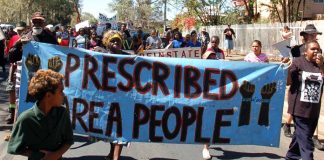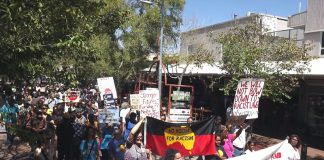The Intervention Rollback Action Group condemns the racist advertising campaign being run by business owner group ‘Action for Alice’ and their calls for further incarceration of Aboriginal people.
We are extremely concerned at deteriorating social conditions facing the Aboriginal community both in urban centres and bush communities. These problems are the fruits of discriminatory government policy. Meeting this crisis must start with a strong stand against racism and for empowerment and positive investment in Aboriginal communities.
The Intervention has failed
Both former Howard government Indigenous Affairs Minister Mal Brough and members of ‘Action for Alice’ have recently said the NT Intervention has been a failure because crime rates have increased. But it is not just crime that has become worse. Government figures show that a broad range of social indicators have worsened since June 2007.
Incarceration rates are up 20 per cent (NT Department of Corrections annual reports). Incidents of suicide and self-harm have increased by more than 50 per cent (NT Closing the Gap Monitoring Report 2010).
More children have been hospitalised for malnutrition since income management was introduced (Closing the Gap in the NT Monitoring Report). School attendance is down across the board and in many communities attendance rates have plummeted – by 30 per cent and Yuendumu and 23 per cent at Lajamanu for example.
It is wrong to claim as Brough does that the Intervention has somehow become ‘soft’ under Labor. Every key Intervention measure remains in place, from compulsory five year leases over Aboriginal land, the imposition of Government Business Managers to ‘run’ Aboriginal communities, race-based alcohol and pornography bans, the dismantling of Aboriginal community councils (an NT government reform facilitated by the Intervention) and the abolition of the Community Development Employment Program or CDEP.
Brough says the difference is he would have had an ‘honest conversation with remote communities about their viability’. But since 2008 Labor has been sending this message loud and clear. There are no new houses planned for the majority of communities despite desperate need. The shut down of Aboriginal community councils in favour of 9 super shires has left remote communities stripped of representation, employment and millions of dollars worth of assets necessary for a functioning community. With CDEP winding up, thousands of Aboriginal workers have been forced onto dole queues while the basic services they provided in remote communities like rubbish collection and sewerage maintenance collapse.
‘Action for Alice’ claims that grog restrictions are bringing people into town. While this may be true in some cases, most are economic refugees. Without local leadership structures, employment prospects, services or support in remote communities, the urban drift identified by representatives of the local Aboriginal organisations can only escalate.
The urban centres lack the necessary emergency accommodation, social services or employment programs to adequately deal with such a population influx, leading to increased homelessness, more public drinking, more property crime and increased contact with police.
Apartheid in Alice Springs
But it is mistaken to simply blame ‘urban drift’ for social problems. And it is outright racist to talk about ‘sending people back’ to bush communities – denying Aboriginal people the basic entitlement of freedom of movement. Out of 26 juvenile break-ins which have occurred since Christmas, 17 were undertaken by youth from Alice Springs, not the bush.
The Aboriginal community in Alice Springs has itself suffered many heavy blows in recent years, fuelling poverty, resentment and marginalisation. The intervention has created an atmosphere of apartheid in Alice Springs.
Race-based restrictions see police and security guards brutally target Aboriginal people in public for simply carrying grog or doing their shopping. Compulsory Income Management has set up a system of segregated service delivery where Aboriginal people are constantly shamed by shop assistants. Prominent signs outside all prescribed areas reinforce stereotypes of Aboriginal people as problem drinkers and sex offenders. Town Council by-laws essentially criminalise public Aboriginal life.
Aboriginal unemployment is at more than 90% in prescribed areas and reforms to CDEP have left the program gutted, with many participants now simply working for quarantined Centrelink payments.
Communities Need Support not Punishment
Since the Intervention, incarceration rates in the NT have risen by 20 per cent. The NT already has one of the world’s highest imprisonment rates, with 83% of the adult prison population being Aboriginal. In Juvenile Detention the rate of Aboriginal incarceration is 88%.
But rather than recognise the obvious failure of punitive policy, ‘Action for Alice’ and Mal Brough are calling for ‘zero tolerance’, mandatory sentencing and more cops. This will only serve to increase incarceration rates and fuel racial tension. Mandatory sentencing was trialled in the NT from 1997 and repealed in 2001 in recognition of its profound failure as a deterrent policy.
Positive solutions must start with the repeal of discriminatory legislation and recognition and encouragement of Aboriginal leadership and Aboriginal rights. An Action plan to meet current social problems must include:
– Reinstatement of land rights in all communities and re-establishment of local government councils. Return of all assets seized through the shire takeover or compensation paid for lost assets.
– Rescinding the 40-year leases taken through blackmail of town camp housing associations.
– Massive investment in community controlled employment and housing programs in all prescribed areas.
– Reinstatement of bilingual education and investment in recruitment and empowerment of local Aboriginal people in the school system.
– Repeal of race-based grog bans and proper investment in communities to deliver alcohol plans and rehabilitation services.
– Reinstatement of Aboriginal customary law and empowerment of elders to deal with justice in communities
– An end to compulsory Income Management and redirection of $350 million budgeted for Income Management over the next four years towards positive social programs.
Calls for more punitive measures must be resisted. We must act immediately to force the removal of the racist advertisements and an end to vigilantism sponsored by groups like Action for Alice. The Intervention must be scrapped and the millions currently being spent on bureaucrats and punitive programs must be redirected to rebuilding Aboriginal communities and Aboriginal leadership.
—————————————————————————————————————————-
Take action against Action for Alice’s racist advertisements: The ads are currently being shown on Imparja Television in Alice Springs and Channel 9 in Darwin, and are also accessible on YouTube.
The advertisements feature footage of Indigenous youth walking on footpaths and other public areas in Alice Springs. A voice-over claims that “gangs of youths from as young as eight years old roam the streets at 3am, damaging property and terrorising residents and tourists”. It also claims that the current generation of Indigenous teenagers are “lawless criminals” and calls for tougher policing and “zero tolerance”.
A complaint to the Human Rights Commission lodged by Central Aranda man and Indigenous rights activist Warren H Williams says:
“I have never encountered anything like the unjust portrayal and vilification demonstrated by these advertisements… Many Aboriginal peoples have seen these advertisements and feel they have been unjustly represented.”
“A serious repercussion of these advertisements is the effect on self-esteem and self-worth, further fuelling a deterioration in the mental health of Indigenous peoples, particularly our youth. There is enough segregation within our society between Indigenous and non-Indigenous people… these advertisements just wedge that gap open even further.”
They call for more a return to mandatory sentencing, dog patrols in urban centres and a night-time youth curfew to address so-called ‘anti-social behaviour’. They are racist and demeaning and must be removed from air.
You can help by making a complaint to the Advertising Standards Bureau at: http://www.adstandards.com.au/
To view the ads go to: http://www.youtube.com/user/AliceInCrisis
Please contact us at [email protected] for more updates on this campaign.





